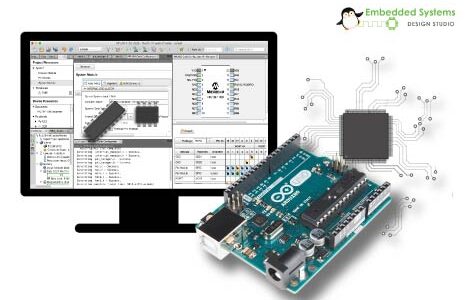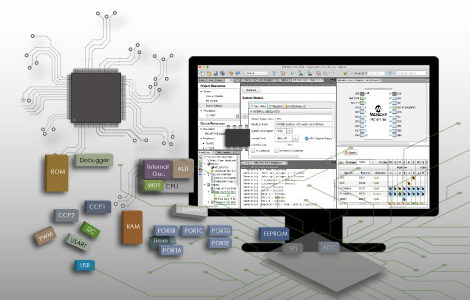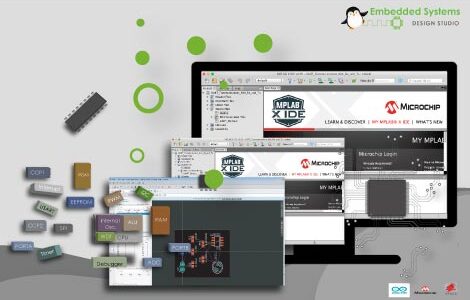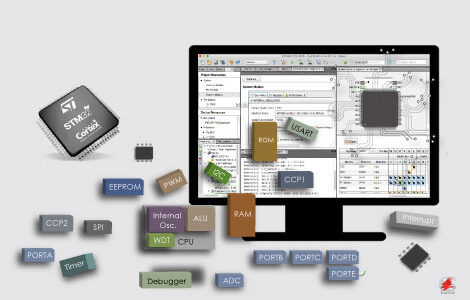This course is a continuation of foundational knowledge, focusing on mastering advanced programming techniques, peripheral interfacing, and IoT integration using Arduino, 8051, PIC18F4550, ARM Cortex-M3, NodeMCU (ESP8266/ESP32), and Raspberry Pi. It emphasizes real-world applications and prepares participants for professional roles in embedded systems and IoT development.
Course Title:
Advanced Embedded Systems Training: Microcontrollers, IoT, and Beyond
Course Overview:
This advanced-level course explores complex embedded systems concepts, IoT-enabled projects, and high-performance computing using Raspberry Pi. Participants will gain in-depth knowledge of various microcontroller platforms, programming, and interfacing techniques while solving real-world challenges.
Target Audience:
- Professionals in embedded systems looking to upskill.
- Students with basic embedded systems knowledge who want to explore IoT and advanced topics.
- Engineers aiming for careers in IoT, robotics, or industrial automation.
Prerequisites:
- Completion of a basic embedded systems course or equivalent knowledge.
- Proficiency in C programming.
- Familiarity with hardware design and debugging tools.
Course Duration:
24 weeks (4-5 hours/week), with self-paced options available.
Each platform is covered in 4 weeks, followed by a capstone project.
Course Outline and Learning Modules
Module 1: Advanced Arduino Programming (Week 1-4)
- Introduction to Advanced Features:
- Exploring timers, interrupts, and watchdog timers.
- Advanced communication protocols: I2C, SPI, and CAN bus.
- Using libraries to enhance functionality.
- Peripheral Interfacing:
- Advanced sensor integration (e.g., MPU6050 for motion sensing).
- SD card interfacing for data storage.
- IoT Integration:
- Wi-Fi-based communication using ESP8266 modules with Arduino.
- MQTT protocol for cloud communication.
- Project: Build a weather monitoring system with cloud storage.
Module 2: Advanced 8051 Programming (Week 5-8)
- Advanced Concepts:
- Power management: Sleep modes and energy efficiency.
- Real-time clock (RTC) programming.
- Peripheral Interfacing:
- Interfacing graphical LCDs and OLED displays.
- Stepper motor and servo motor control.
- Applications:
- Design an energy meter using ADC, DAC, and external EEPROM.
- Project: Develop a keypad-controlled security system with data logging.
Module 3: Advanced PIC18F4550 Programming (Week 9-12)
- Advanced Concepts:
- RTOS integration with PIC18F4550.
- USB device development: CDC and HID examples.
- Peripheral Integration:
- Interfacing sensors for industrial monitoring.
- CAN protocol communication for automotive applications.
- Applications:
- Real-time data acquisition system with USB connectivity.
- Project: Build a USB temperature and humidity data logger.
Module 4: Advanced ARM Cortex-M3 Programming (Week 13-16)
- RTOS Concepts:
- Task scheduling, semaphores, and message queues.
- Implementing FreeRTOS on STM32.
- Peripheral Interfacing:
- DMA for high-speed data transfer.
- Interfacing with high-resolution TFT displays.
- IoT and Security:
- SSL/TLS communication for secure data transfer.
- Interfacing IoT modules like ESP32 with STM32.
- Project: Create a secure IoT-enabled device with sensor data visualization on a cloud dashboard.
Module 5: NodeMCU (ESP8266/ESP32) IoT Programming (Week 17-20)
- IoT Basics with NodeMCU:
- Setting up NodeMCU for Wi-Fi communication.
- Configuring MQTT and HTTP protocols.
- Advanced Topics:
- Over-the-air (OTA) firmware updates.
- Real-time data visualization using ThingSpeak, Blynk, and Firebase.
- IoT Applications:
- Home automation using Google Assistant integration.
- Energy monitoring and control using NodeMCU and relays.
- Project: Develop a smart home monitoring system with NodeMCU.
Module 6: Raspberry Pi for Embedded Systems and IoT (Week 21-24)
- Introduction to Raspberry Pi:
- Setting up Raspberry Pi with Raspbian OS.
- Basics of Python programming for hardware control.
- Hardware Interfacing:
- Interfacing sensors and actuators using GPIO.
- I2C and SPI communication with external devices.
- Advanced IoT Applications:
- Building a local MQTT broker using Raspberry Pi.
- Camera module integration for video streaming.
- Project:
- Build a Raspberry Pi-based IoT gateway for multi-sensor data collection and cloud integration.
Capstone Project (Weeks 25-26)
Participants will combine multiple platforms to develop a fully integrated embedded system.
Example Capstone Projects:
- IoT-enabled weather station with Arduino, NodeMCU, and Raspberry Pi as the central hub.
- Industrial automation system using ARM Cortex-M3 with NodeMCU for remote monitoring.
- Vehicle telemetry system using PIC18F4550 and Raspberry Pi for data analysis.
Course Features:
- Hands-on Learning with simulation and real hardware.
- Practical Exercises for every module with detailed source codes.
- Expert Guidance on designing and debugging complex systems.
- Real-world projects focused on IoT, robotics, and industrial systems.
- Comprehensive Resources: Circuit diagrams, code libraries, and project guides.
- Certificate of Completion for successful participants.
Learning Outcomes:
By completing this course, participants will:
- Master advanced programming techniques for Arduino, 8051, PIC18F4550, ARM Cortex-M3, NodeMCU, and Raspberry Pi.
- Gain expertise in IoT-based systems and cloud integration.
- Develop scalable, secure, and efficient embedded systems.
- Be prepared for challenging roles in IoT and embedded systems design.
- Build confidence in combining multiple platforms for large-scale applications.













Hands on training program